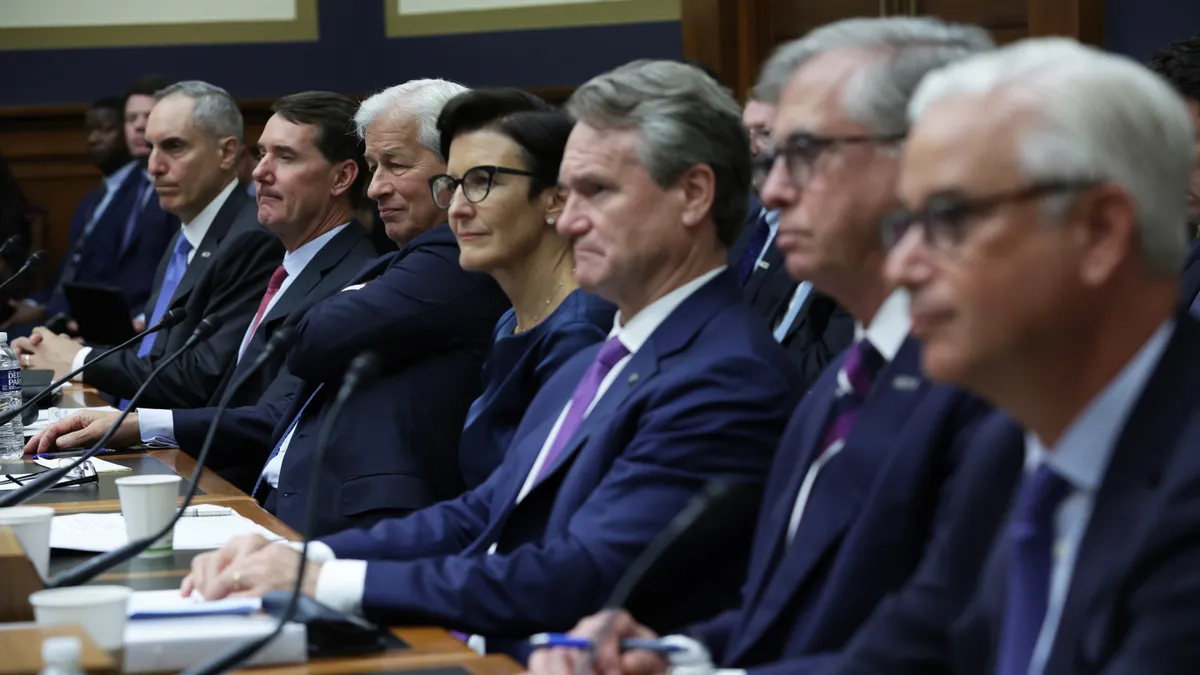Increased bank capital requirements and the impact of geopolitical turmoil could be prominent topics at an upcoming Senate Banking Committee hearing in which lawmakers will have the opportunity to question the CEOs of the nation’s largest banks, industry stakeholders predicted.
JPMorgan Chase's Jamie Dimon, Citi's Jane Fraser, Bank of America's Brian Moynihan, Goldman Sachs' David Solomon, Wells Fargo's Charlie Scharf, Morgan Stanley's James Gorman, State Street's Ronald O'Hanley and BNY Mellon's Robin Vince, are expected to show up for Wall Street’s annual grilling Wednesday in front of the Senate panel.
The bank executives will likely use the forum to push back against regulators’ proposal to raise capital requirements for the nation’s largest banks. The heightened requirements come as regulators look to align the U.S. more closely with international standards developed by the Basel Committee on Banking Supervision, which were created in the wake of the 2007-08 financial crisis.
“You’d better believe there are going to be questions about the Basel III update. There has been incredible pushback,” said Mayra Rodriguez Valladares, a capital market consultant and trainer who works with banks on risk and management issues. “[The CEOs] will say that Basel III will reduce their lending and will hurt the economy.”
After U.S. regulators unveiled their proposal for higher capital requirements this year, banks and bank trade groups have mounted a strong opposition to the new measures.
Dimon called the proposed regulations “hugely disappointing,” while Moynihan said the increased capital buffer would hamper Bank of America’s lending activity.
Goldman Sachs also launched an ad campaign imploring the Federal Reserve to “stop the squeeze.”
“The Federal Reserve and the regulators pushing new capital standards — that's going to be something that bank CEOs really want to push back on at the hearing. And I'm sure Republicans will give them the ability to do so,” said Aaron Cutler, a partner at Hogan Lovells.
Sen. Tim Scott, R-SC, the panel’s ranking member, told Reuters he will focus on Basel and other "burdensome" regulatory proposals.
"I look forward to hearing directly from the businesses that will be impacted, and in turn, how these proposals will increase costs and limit access to credit for the Americans who need it most,” he said.
Geopolitical tensions
International conflicts, such as the current Israel-Hamas war and Russia’s war with Ukraine will also likely come up during Wednesday’s hearing.
“I think I would be shocked if Jamie Dimon did not bring up geopolitical risk. He's one of the first CEOs to really say this is the highest level of geopolitical risk he’s ever seen,” Valladares said. “He's the only CEO still around from the 2007-2009 crisis. So when he says something like that, when anybody says something like that that’s been around as long, that's something to take into consideration.”
“This may be the most dangerous time the world has seen in decades,” Dimon said in a statement accompanying the bank’s third-quarter earnings in October.
Senators who are “switched on” to the current geopolitical landscape will likely ask how international conflicts will affect loan book and credit risk, Valladares said.
“That's the kind of thing you want to ask the CEOs right now because there's just serious potential for the Israel conflict to spill over. And it tends to, obviously, put pressure on oil prices, which is inflationary and makes it very difficult for the Federal Reserve, Bank of England or European Central Bank to stop raising rates,” she added.
Cutler agreed that geopolitics could come into focus during the hearing.
But while banks have been on the front lines of the sanctions war that the U.S. and European nations have been waging on Russia, lawmakers aren’t likely to grill the CEOs on the “nitty gritty” of their sanctions compliance programs, Cutler said.
“Will they get into Israel-Hamas? They’ve certainly talked about Russia-Ukraine before,” he said.
Bank turmoil
While the March regional banking crisis will likely be considered the biggest event to hit the banking industry this year, Valladares and Cutler agreed it won’t be a top issue at Wednesday’s hearing.
“The big banks are in good shape in terms of liquidity. And they are also in very good shape in terms of diversification of their liabilities,” Valladares said. “Their sources of funding are so much more diversified and that is certainly not the case for regional banks, and even less so for community banks.”
The March crisis will likely come up, but senators may take an educational approach to the issue, Cutler said.
Senators will want to know the “how” and “why” of the crisis: how it happened and how it can be prevented from happening again, he said.
“What if this were a bigger bank? Are we in good shape? And that also ties into the capital standards,” he said.
Time to shine
For several lawmakers that sit on the panel, the strong media focus that will accompany Wednesday’s hearing is an opportunity to showcase their commitment to Main Street over Wall Street, Cutler said.
“Sen. Sherrod Brown is going to have a tough general election in 2024, so this is a blockbuster hearing for him,” he said, referring to the panel’s Democratic chair from Ohio. “I think he's very much going to have the people back in Ohio on his mind as he goes through this hearing.”
Scott, who recently pulled out of next year’s presidential race, will also likely see Wednesday’s hearing as an opportunity to reassert his commitment to the Senate, “roll up his sleeves and shine,” Cutler added.
“Both leaders of the banking committee really are going to want to knock it out of the park. I think there will be a lot of media focus and attention, so this is a big deal for them to get those CEOs up there,” he said.






















